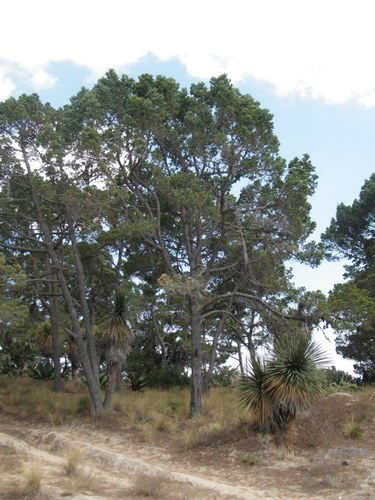|
| Common Animals Fish Mushrooms Flora |
|
Pinus cembroides |
http://en.wikipedia.org/wiki/Pinus_cembroides
https://en.wikipedia.org/wiki/Pinus_johannis
July: Continued cone growth and photosynthesis.
Safe for humans, may cause allergic reactions in sensitive individuals. Mexican pine is native to the southern US states and Mexico.. Pinyon nuts are traditionally harvested in late summer to early autumn.. Used in cuisine and traditional medicine by indigenous peoples..
A small coniferous tree with short needles and large cones.. Cones contain edible, oily pinyon nuts..
Cone collection takes place in late summer to early autumn. Mature cones are harvested to obtain pine nuts (pinyon nuts).
Best time to collect is when cones begin to open.. Seeds are extracted after drying the cones..
Seeds are shelled and dried.. Store nuts in a cool, dry place.. Seeds are edible after proper processing; raw consumption is not recommended.
Seed: Oily nut with pleasant taste
Shell: Hard, inedible
Shell: Hard, inedible
Roasted pinyon nuts (Roasting)
Simple and tasty snack
Simple and tasty snack
1. Roast shelled nuts in a dry pan until golden brown.
2. Cool and serve as a snack.
2. Cool and serve as a snack.
Pinyon nuts in salads and baking (Adding)
Nuts add texture and aroma
Nuts add texture and aroma
1. Add shelled nuts to salads, baking, or desserts.
2. Optionally roast lightly for enhanced flavor.
2. Optionally roast lightly for enhanced flavor.
Pinyon nut paste (Grinding)
Used as a spread or in sauces
Used as a spread or in sauces
1. Grind nuts to a paste.
2. Add oil, salt, and spices to taste.
2. Add oil, salt, and spices to taste.
Porridge with pinyon nuts (Boiling)
Traditional dish with nuts added
Traditional dish with nuts added
1. Cook oatmeal, rice, or buckwheat porridge.
2. Add chopped pinyon nuts and honey.
3. Mix and serve warm.
2. Add chopped pinyon nuts and honey.
3. Mix and serve warm.
 México · Coahuila · Torreón
México · Coahuila · Torreón






